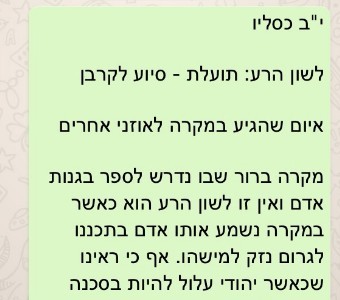WhatsApp's Strengthening Version: Do You Have a Study Partner for a Page of Gemara?
Keeping Connected to Life: The Orthodox World Adapts with Wholesome WhatsApp Groups for Community and Support.

Again, that familiar sound—a new message. I hesitate to check my phone, after all, there's no emergency, and I've set specific times for this. But this time is different: "Looking for assistance tomorrow morning between 7-8 AM to take a couple from Elad to Tel HaShomer."
Much has been written and spoken about the negative impacts of technological wonders. I, the writer of these lines, was among the staunch opponents, writing against the free messaging apps and their harms. But gradually I realized that there are people who have found a way to channel this advancement into something powerful and beneficial. But why jump ahead?
"Strengthening WhatsApp groups," was assigned as my article topic. I wondered what that even means. Within an hour of beginning my research, I already had three phone calls lined up. Read till the end, and you might want them too. Their commonality: each manages a "Strengthening WhatsApp Group."
 From Connected to Life message
From Connected to Life message
The first person I talked to is Yoni, a 26-year-old Orthodox student at the Lev Institute, married and a father of three. Yoni runs a daily halacha group. "It started unintentionally," he tells me gently, requesting to remain anonymous. "Every morning I receive a daily halacha email from a friend. Over time, I wasn't always available to check emails, so receiving it directly on my phone seemed convenient." Yoni decided to share this with others and quickly filled a WhatsApp group with daily halachot, benefiting dozens.
"Sometimes, the daily halacha is their only connection to something holy"
Yoni doesn't personally know most members, and he strictly avoids idle chatter in his groups to prevent deterring people, emphasizing "pure daily halacha only." His groups include a diverse mix—from mainstream ultra-Orthodox to those whose religious connections are minimal—and even former ultra-Orthodox members. "This diversity is beautiful," Yoni explains as his main motivation. While busy, he sees his efforts as a chance to engage people with religion, often dedicating halachot to people's well-being or successful military operations in Gaza. "I'm doing it to benefit others," he states. When I offer to forward my husband’s contact after he requests to join, Yoni accepts another "merit."
Unlike Yoni’s organized group, Avi's, 28 from Bnei Brak, brims with debates on Gemara pages, difficult questions, and Torah-based commentary. Outside his Torah studies, Avi works in emotional support for at-risk youth, channeling them into his passion for music. Two years ago, "without intention," he started "Asteck B'Orayta" during the "in-between times." This group quickly filled with a vibrant tapestry of people and ideas, its goal being to clarify issues and share insights on daily studies.
 Group for Monitoring Speech
Group for Monitoring SpeechIsn't it a bit odd to study Gemara in a place like WhatsApp?
"I'm well aware of the differing opinions within the community regarding the legitimacy of mobile devices," Avi says, "running the group doesn’t confer any ‘approval’. However, living among my people, I see technology's existence—permitted or not—is widespread. My role isn’t to judge but to guide," Avi explains. He believes there are two approaches to "cleaning up dirty dishes": scrub intensely or soak gently in warm water, easing dirt off by itself. Avi prefers leveraging existing tools positively, turning them into a "Torah seasoning," filling devices with enlightening Torah words that might guide everyone to a better path.
Indeed, Avi's group includes people from abroad living in remote places without study partners, making his group a beacon of light. "I might wake up at night, glance at my phone, and see people engaged in 'deep study' at three in the morning," Avi smiles.
My final discussion, unplanned, led me to connect with two women's groups. Again, I rush ahead, eager to share everything.
When I asked who manages Ezer Mizion's charity group, everyone laughed. Manager? They asked in unison. You mean the dozens of managers? Efficient as ever, I sought their head. The name from every mouth: Meir Quin, 38, a teacher in Modi'in Illit who volunteers when not teaching. Born to a culture of goodwill—his father managed Ezer Mizion’s Jerusalem branch for decades—Meir knew it was natural to steer technology towards goodwill and mutual aid. He leads 70 managers across Israel, overseeing 3,000 members of all backgrounds, fully dedicated to kindness.
Could you say the WhatsApp groups make people's lives easier?
"Unequivocally yes," Quin affirms, his friends affectionately calling him "bulldozer" for his relentless efficiency. "It's not that we couldn't manage before," he explains. Arranging a patient's transportation to a hospital once took half a day, now it takes half an hour."

How does it work, and how did it start?
"It began in Modi'in Illit," Quin recounts. "A city of 70,000 with perhaps 1,000 cars. Friends and I contemplated our ability to aid those needing transport to hospitals or other assistance." Primary activities focus on travel arrangements, such as aiding families split by medical emergencies. The groups organize rides, sometimes adjusting routes slightly to help those in need. Quin's extensive volunteer operation states, "Whether for scheduled or spontaneous tasks, if a call remains unanswered, someone could make a special trip to assist."
Information is shared through Ezer Mizion or community channels. With so many groups, word spreads quickly. Sometimes coordinators swap information, passing requests between cities as needed. Over time, these needs evolved to encompass food distribution and other duties. Group members can take tasks like providing transport or preparing meals for needy families. Such social progress might seem small but, as Quin demonstrates, deploying one bone marrow sample to a remote soldier is an immense logistical feat achieved in mere hours.
Maximizing Efficiency in Lifesaving Through 24-Hour Bone Marrow Testing
A major volunteer contribution entails transporting bone marrow compatibility test tubes. Ezer Mizion maintains a vast marrow sample repository in Petach Tikva. After initial matches, two further tests confirm compatibility—structured, numbered, and coded sample vials reaching matched individuals at clinics, culminating in lab tests for ultimate validation before donor contact.

"Such samples must be processed within hours," Quin insists. "For instance, a sample delivery from Petach Tikva to a soldier serving near Yerucham: a volunteer takes the vials from Petach Tikva to Netivot, hands them off to a Be'er Sheva volunteer who then passes them to Yerucham. A local paramedic meets the recipient at camp, refrigerates the blood, and promptly relays it with another volunteer back to the lab in Petach Tikva. It's a multi-volunteer feat saving 500 people weekly." Quin acknowledges the project's success depends upon 70 leaders and 3,000 devoted volunteers "whose commitment we deeply appreciate."
I'm reluctant to conclude without mentioning the two local women’s groups joined reluctantly: a ride-sharing group and meal distribution effort. I've already seen their seamless operations—by the time I open their messages, they've organized meal distributions for needy families, along with complementary dishes, within a day. Can anything be more remarkable?
Every group asserts unanimously: they wouldn’t trade managing these groups for anything. And somehow, I understand completely. Blessed are they and their portion.
***************************
To join the daily halacha group, contact Yoni: 0546701225
To join the Asteck B'Orayta group, contact Avi: 0544312510
To join the Ezer Mizion group, contact Meir: 0525808936
Please leave your name and residence location in the message
May you earn merits

